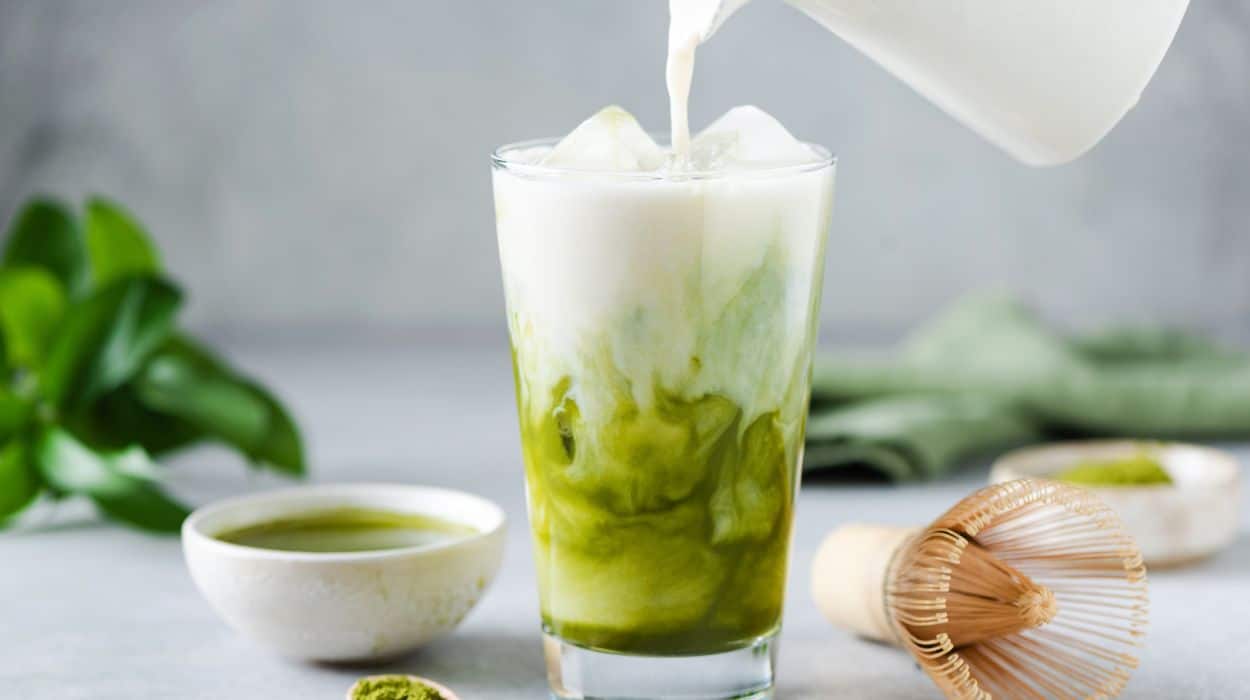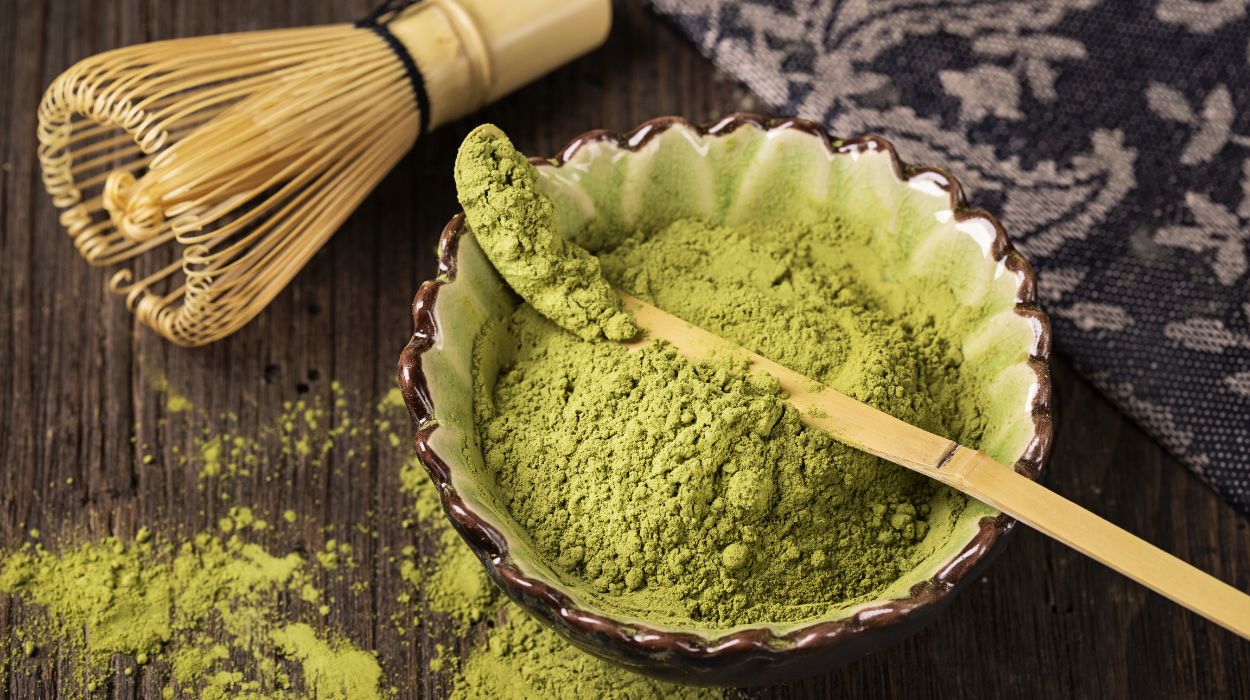Matcha green tea has agreeable health advantages. Many people from many different cultures around the world use it to enhance gut, brain, and heart health. But there are questions about its efficacy. This review analyzes matcha and describes its sources and uses.
Matcha is a fine powder made from green tea extracts. Regardless, both forms are extracted from the same plant. It is derived from the Camellia sinensis plant, which also yields oolong and black tea. Matcha[1] is well-known for its health benefits, particularly to the gut, heart, and brain. The Chinese and Japanese value these and other health benefits of matcha and have used it for millennia for medicinal purposes. Matcha tea is a popular beverage all over the world. Because it is high in antioxidants, many people use it as a dietary supplement.
Matcha Health Benefits
- Promoting Heart Health
- Improving Dental Health & Brain Health
- Aiding In Reducing Weight
- Curbing Digestive Symptoms
- Improving The Skin’s Health
- Fighting Cancer
- Boosting Immunity
- Detoxifying the Body
Matcha Green Tea Benefits
Promoting Heart Health Benefits
Matcha powder, like green tea leaves, has a profound effect on the functionality of the heart. The high antioxidant content of matcha, particularly green tea catechins, benefits the cardiovascular system. It lowers blood pressure, reducing the workload on the heart. It also reduces the risk of heart disease by lowering bad cholesterol (low-density lipoprotein).
Matcha tea has antioxidant properties that help to protect blood vessels from oxidative stress and inflammation, which benefits the cardiovascular system even more. Healthy blood vessels keep the heart healthy by ensuring adequate blood flow and oxygen supply.
Improving Oral Health
Matcha powder has natural breath-freshening properties. It contains a variety of catechins, including antibacterial epigallocatechin gallate (EGCG). The potent antioxidant aids in the prevention of numerous bacteria linked to tooth decay and gum disease.
Minimizing the negative effects of harmful bacteria aids in the fight against bad breath. Furthermore, although in small amounts, the calcium in matcha tea strengthens teeth, contributing to overall dental health.
Improving Brain Function
Matcha green tea constituents have a wide range of effects on the effectiveness of brain cells. Caffeine is one of the components of green matcha tea. Drinking matcha regularly aids brain function by increasing an individual’s alertness level. Consuming matcha on a regular basis, such as throughout the day, provides the body with the caffeine it requires to stay alert.
L-theanine is another important matcha component. The component aids in the relaxation of the brain by reducing stress and anxiety. Matcha also improves brain function by quickening reactions, increasing attention, improving memory, and relieving headaches.
Aiding To Burn Calories
One of the most well-known matcha health benefits is its ability to help shed excess weight. Matcha promotes weight loss by influencing the gut-liver axis.[2] As a result, consuming matcha is regarded as an effective nutritional strategy. Green tea powder is extremely effective at reducing obesity.
According to academic research, drinking green tea gradually slows the rate at which users develop obesity and accumulate lipids. As a result, the person’s fecal bile acid profile is restored, increasing the efficiency of bile production and metabolism.
Matcha tea also aids in the restoration of gut microbial composition, which improves a variety of food-related processes such as digestion, nutrient absorption, and metabolism. It also boosts the rate at which the human body expends energy and oxidizes fat while decreasing fat absorption and lipogenesis. Matcha tea also aids in the prevention of various metabolic disorders that can lead to uncontrolled weight gain. When these effects of matcha tea are combined, they promote a healthy lifestyle.
Curbing Digestive Symptoms
When gut microbial composition is poor, it leads to digestive system issues such as irritable bowel syndrome and inflammatory bowel disease. Similarly, a low fecal bile acid profile causes digestive symptoms such as malabsorption and IBD.
Matcha tea improves gut microbial composition, fecal bile acid, and other digestive system phenomena, alleviating ill-health symptoms. Matcha tea aids the digestive system’s recovery process, aids in the elimination of causative factors, and protects it from potential functional issues. Matcha’s antioxidants improve gut health even more by reducing inflammation.
Improving Skin Health
The ability of matcha to improve the digestive system and affect other changes in the body’s internal processes benefits the skin’s health. Healthy internal processes are essential for overall health. One of the indicators of good health is healthy skin.
Matcha powder contains antioxidants, polyphenols, and other skin-healthy compounds. Antioxidants protect the skin from harmful free radicals. Additionally, their anti-inflammatory properties aid in the relief of irritated skin.
Cancer Prevention
Matcha has cancer-fighting properties. Several studies have found that the catechins and phytochemicals found in powdered green tea improve the efficacy of cancer treatment drugs.
The phenolic acids in matcha inhibit cancer cell growth.[3] The phenolic acids regulate carbohydrate and lipid breakdown and absorption, which aids in the treatment of metabolic issues. One of matcha’s most important health benefits is its ability to inhibit cancer cell growth and spread to other body parts.
Boosting Immunity
EGCg, an antioxidant found in matcha powder helps the body fight infections caused by various pathogens, particularly bacteria. The catechin strengthens the body’s defense mechanism by integrating into cells and inhibiting the development of pathogens that attack them.
Matcha’s antioxidants also help the immune system by inhibiting free radical activity. Antioxidants prevent highly reactive molecules from causing inflammation, thereby improving immune function.
Matcha is also high in Vitamin C, a powerful antioxidant. Vitamin C is an essential nutrient that helps the body’s immunity by stimulating the production of white blood cells and inhibiting free radical-induced inflammation.
How To Drink Matcha?

The most common way to consume matcha is to make it into tea. You can make frothy green tea by whisking it into hot water. Although it is not completely soluble, it can be dissolved in hot water to make green tea.
Whisk together a quarter teaspoon of matcha and 2 ounces of hot water. Then, add another 6 ounces of water and stir until it becomes frothy. You can improve the flavor of the tea by adding a few drops of honey or maple syrup.
The traditional matcha tea is the end result. There are several other ways to prepare matcha tea, such as making a matcha latte by adding steamed milk and whisking it together. You can drink up to 8 cups of matcha green tea per day.
Matcha can also be consumed in a variety of other ways, such as in smoothies and juices, as a flavoring in baked goods, and as a supplement.
Where To Find Matcha?

Quality matcha powder can be found in a variety of grocery stores and convenience stores near you. You can also order the product from a variety of online retailers, including:
- Walmart
- Whole Foods
- Publix
- Amazon
- Costco
Buying fine matcha powders online from reputable sources is highly recommended because it allows you to learn about the quality of each brand. You can also read reviews on each of them to make an informed decision.
Conclusion
Matcha green tea powder is one of the healthiest foods available. It has numerous health benefits, including weight loss, when consumed regularly. Numerous scholarly studies conclude that its constituents are extremely beneficial to the human body, despite not being officially recognized as a medication.
Frequently Asked Questions
Matcha is a type of green tea extract made from Camellia sinensis that has been shade-grown.
There are numerous health benefits of matcha tea, particularly for the cardiovascular, nervous, and digestive systems.
Yes, matcha is generally considered safe for consumption. However, it must be consumed in the appropriate amounts to avoid side effects such as stomach upset and nausea.
You can drink up to 8 cups of matcha green tea daily.
It is not believed that matcha is addictive. If matcha is consumed frequently and in large quantities, however, psychological dependence may develop.
Matcha can be consumed while pregnant or breastfeeding. However, limiting daily consumption to 6 cups is highly recommended.
Yes, studies show that matcha green tea can aid in healthy weight loss due to its high antioxidant content and ability to boost metabolism.
 Expert's opinion
Expert's opinion
